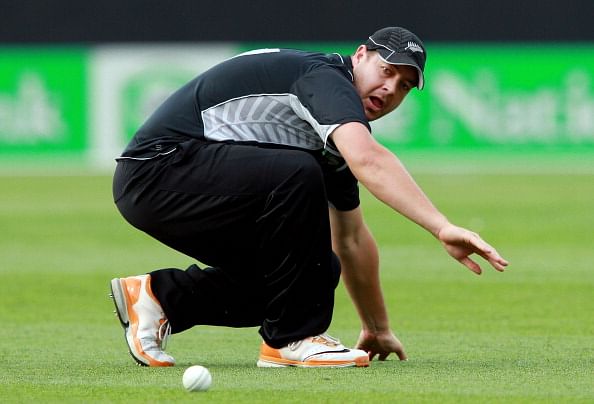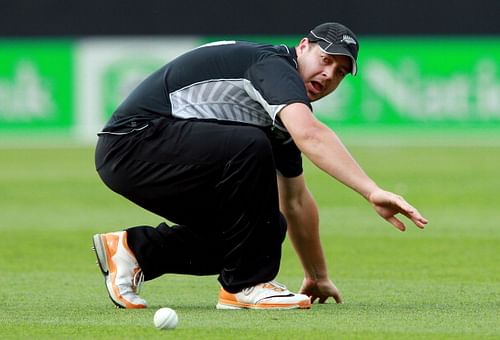
Jesse Ryder: the troubled maverick
“There’s a little bit of the redneck in all of us.” – Kaleb McIntire, country music singer.
Jesse Daniel Ryder would agree with McIntire’s lyrics. Life, in recent times, has tested his limits of endurance.

Jesse Ryder has had a troubled cricketing career
He has seen it all – the boozy nights, the triumphs on the cricket field, disciplinary breaches, and a recent life-threatening experience.
Born on 6 August, 1984, Jesse suffered his first emotional blow when his parents separated. He moved around with his father Peter before finally settling in Napier. As he would recount in 2009, the youngster basically did what he wanted – without any rules or boundaries in place. He and a close friend would stay at home twice or thrice a week, fiddling with their PlayStation or playing cricket in the backyard, while Jesse’s dad would return in the early hours of the morning.
Peter Ryder was too busy to care for his son. Or maybe, he just didn’t want to be burdened with the responsibilities of being a single parent. So one day in 1998, when Jesse was 14, his father bolted to Australia after dropping him off at a friend’s place.
That was Jesse’s his second emotional blow – barely into his teens, he was suddenly without a parent and a stable home. That’s when he started partying; no rules, no set boundaries, nothing.
Bouncing around friends’ homes and indulging in what he now terms “binge-drinking”, Jesse also discovered a new talent: cricket. The rough, slightly rotund youngster eventually went on to represent New Zealand in the 2002 U-19 World Cup.
In that tournament, Ryder made a mark during the Super League match against Australia, blasting a hurricane 70 off 62 balls – catching the Kangaroos by surprise. However, Australia won thanks to a match-winning innings from captain and all-rounder Cameron White. Nevertheless, Ryder had caught the public’s eye with his power hitting.
His cricketing exploits saw him make the Wellington side in the 2002-03 season, and five years later, he made his ODI debut in the series against England. In the second game of that tourney, Jesse won his first Man-of-the-Match award for his blistering innings of 79 runs in 62 balls.
New Zealand Cricket‘s Selection Manager, the legendary Sir Richard Hadlee, had stated that the left-hander had the potential to provide an explosive start along with Brendon McCullum at the top of the order; Jesse seemed well on the way to justify his belief.
But all that changed on February 24, 2008. The rebellious streak, primed by yet another drinking bout, resulted in the young man cutting his hand badly while trying to break into a toilet at a Christchurch bar. NZ had just won the ODI series against England, and it was revealed that Jesse had been drinking until 1.30 am prior to the final game. His demand for preferential treatment at the hospital led to altercations with the staff – just another example of his long struggle with alcohol and anger management.
Former NZ wicket-keeper Adam Parore’s comments – that Ryder was too fat and in no fit state to play for the country – had also rankled the young all-rounder. At the time, he had laughed it off before unleashing his signature flicks and short-arm pulls against England. The 24-year-old’s talent was never in question; it were his off-field indiscretions that were fast becoming his bugbears.
He was dropped from the ODI side in January 2009 following another drinking session which caused him to miss a team meeting. He admits that it was a “real” wake-up call after being unable to train in the afternoon – something his fellow teammates would not stand for. It shocked him to the core – he had never wanted to let his boys down.
NZC’s then-CEO Justin Vaughan and Jesse’s manager Aaron Klee were on hand to help the young cricketer as he battled his drinking problem and re-focused his attention towards his game. He agreed to go “cold turkey”, refraining from alcoholic binges altogether.
During India’s tour of New Zealand, Ryder shone with the bat – scoring 225 runs during the ODI series, including his maiden century (105 off 72 balls). He also posted his first Test double century at Napier during the second match of the series, scoring 201 in a partnership of 271 with good friend Ross Taylor. It was a glorious period for Ryder – he became the first New Zealander, since Nathan Astle, to score two centuries in two consecutive Test matches.